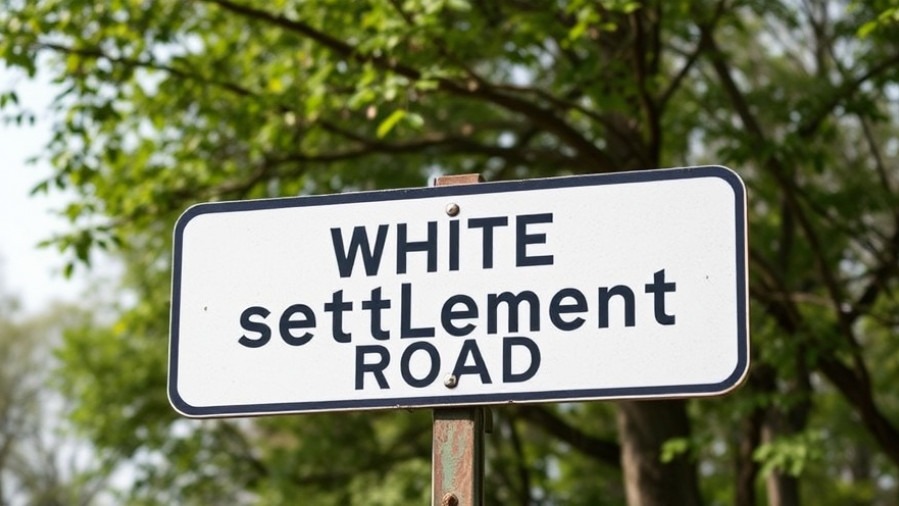
Community Pushback Against White Settlement Road Name Change
In a significant confrontation between historical reverence and modern development, the Fort Worth City Council is set to vote on a proposal that would rename a part of White Settlement Road to Westside Drive. The road, notorious for its ties to painful events in Fort Worth's past involving Native Americans, has sparked a heated debate among residents, local historians, and city leaders.
The name change is proposed by the developers of the ambitious $1.7 billion Westside Village project, which will encompass a mix of residences, shops, and cultural spaces. Notably, they have pledged to cover the costs, estimated at nearly $26,000, associated with updating city maps and signage. This has led to comments from Councilwoman Elizabeth Beck, who acknowledged the historical context but highlighted the contribution of naming to a sense of place in new developments.
The Historical Context of White Settlement Road
The name 'White Settlement' has deep roots in Fort Worth's earlier history as a location where settlers displaced Indigenous communities. Activists like Jimmy Joe Jenkins, of the River District Neighborhood Alliance, argue that renaming such a historically significant road disregards its past. "Development is not a reason to change history," Jenkins stated emphatically, stressing the community's collective memory and identity linked to the name.
Arguments for and Against the Change
The discussion brings forth compelling arguments from various community members. Opponents of the renaming, like Jenkins, believe that the public should have a say rather than ceding the decision to corporate interests. Meanwhile, supporters of the change point out that, for many, the current name carries painful associations. District 9 Councilmember Elizabeth Beck noted, "For large portions of our community, it’s a very painful name,” emphasizing a sensitivity to how history is viewed through different lenses.
Local business owners, such as Native American sisters Lily Mekeel and Dancing Iglesias who run a thrift store along White Settlement Road, stress that while the name raises important dialogues, any name change should honor Indigenous heritage rather than just aim for commercial appeal. "The only way I’d want the name to be changed is if it actually honored Native people," Mekeel articulated, encapsulating a sentiment shared by many who are concerned that the proposed name, Westside Drive, serves more to obscure history than honor it.
Other Community Perspectives on the Road Name
With the impending City Council vote, sentiments across Fort Worth vary. Some community members advocate for a name change as a step towards reconciliation, arguing that it reflects a broader societal shift towards embracing inclusive narratives. Others fear that altering the name could erase crucial educational opportunities about the city's complex history. It’s a nuanced debate that pushes to the forefront critical questions surrounding how cities remember their past.
Future Implications for Naming Policies
This situation foreshadows potential shifts regarding naming policies in cities across the nation. As communities reassess the legacies tied to certain names, the importance of inclusive discourse and historical awareness comes to light. Fort Worth’s decision next week could serve as a precedent, informing future developments and municipal actions concerning historical site names throughout Texas and beyond.
A Call for Balanced Recognition
As the council considers the vote, it serves as a pivotal moment for Fort Worth residents to advocate not just for a name change or its retention, but for the integration of history into community identity. Creating a dedicated historical marker, as some proponents suggest, could pave the way for educating current and future generations about the realities of the region's past.
The upcoming decision will lead to significant implications for community engagement and historical acknowledgment in Fort Worth. Whether the name remains the same or changes, the dialogue it has ignited emphasizes the need for ongoing discussions about history, memory, and progress.
As you reflect on the identity of your community, consider how heritage plays a role in your local culture. Engage with others about these critical discussions and contribute to shaping your neighborhood’s narrative.
 Add Element
Add Element  Add Row
Add Row 



Write A Comment